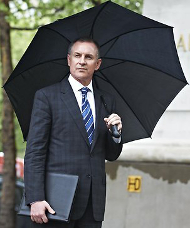SA unveils $1b solar plan
 South Australian Premier Jay Weatherill has announced plans to build a $1 billion battery and solar farm by year's end.
South Australian Premier Jay Weatherill has announced plans to build a $1 billion battery and solar farm by year's end.
The builder, Lyon Group, says the project is 100 per cent equity financed and construction can begin within months.
The company says land near Port Augusta had already been secured and grid connection is well advanced.
“Riverland Solar Storage's 330-megawatt solar generation and 100-megawatt battery storage system will be Australia's biggest solar farm with 3.4 million solar panels and will also include 1.1 million batteries,” Lyon partner David Green said.
Martin Sevior – Associate Professor of Physics at The University of Melbourne – says it looks like a good idea.
“I presume [the farm] will provide 330 MegaWatts of power and 100 MegaWatt-Hours of storage. Thus the system will provide 330 Megawatts of power for a little over 18 minutes or 100 MegaWatts of power for 1 hour,” he said
“Provision of fast acting, high-power systems like this provides resilience against catastrophic events, like the state-wide blackout event last September. The location of the system in the Riverland region of South Australia provides geographical resilience as well.
“In general, the provision of cost-effective, grid-scale storage capability is essential as we move to a grid where the majority of energy is provided by wind and solar sources.
“This announcement is an important step towards this.”
Ian Hore-Lacy – a Senior Research Analyst at the World Nuclear Association – does not see it that way.
“This is a fascinating project, but it will inevitably take South Australia further from having reliable low-cost power,” he said.
“Events in South Australia have shown that reliance on weather-dependent renewables requires dispatchable and synchronous power supply to keep the lights on.
“A 100 MW battery system of undeclared capacity (MWh) is not going to be much help in a 3 GWe system even if it turned out to be 400 MWh.
“Spending a lot of money on more wind or solar with a low capacity factor will make the provision of reliable dispatchable power less economic, and erode the state’s energy security.
“From today, Victoria will be flat out avoiding blackouts itself without being able to subsidise SA’s improvidence, as in the past.”








 Print
Print